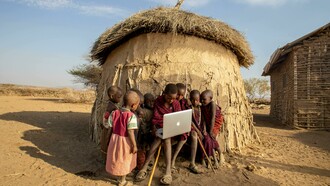Today, there are no empires, at least not officially. An empire is usually created by conquest and divided between a dominant center and subordinate peripheries. The center of the empire exercises political control over the peripheries. Empire implies colonization and expansion under a single ruler. Genghis Khan, Alexander the Great, Julius Caesar, and Napoleon were the greatest conquerors; the British Empire conquered the most of the world. In Mesopotamia (the oldest empire), powerful city-state rulers gained more power by conquering their neighbors. (Basileus is a Greek term for various types of monarchs, emperors, and bishops of the Eastern Orthodox Church.) Basileus Alexander the Great (Alexander III of Macedon) conquered vast territories from the Balkans, Greece, to Egypt, Mesopotamia, Persia, Pakistan, and India. And he amassed the largest empire in the entire ancient world in a remarkably short period of time. The Ancient Kingdom of Macedonia (Alexandrian Empire) lasted from 336 BC to 323 BC. The Roman Empire was founded when Augustus Caesar proclaimed himself the first emperor of Rome in 31 BC and came to an end with the fall of Constantinople in 1453 CE. The heirs succeeded the emperors.
The power of the Senate was limited, and it became an organ to support the emperor. Ancient Rome was ruled by a king; next, it was a republic led by two consuls and a group of 600 men called a senate. Finally, it was an empire ruled by an emperor. The last emperor was Constantine, who became the sole emperor of the West. The Roman emperors had absolute power. The Roman Empire lasted 1000 years, from 753 BCE to 476 CE; it even lasts today in the form of the Catholic Church. Either way, Rome, as a civilization, lasted for over two millennia. The Mongol Empire was founded by Genghis Khan in 1206. Kublai Khan (the grandson of Genghis Khan) ruled as an intellect and warrior to create one of the greatest empires in history. Unlike other empires that relied on hereditary monarchs, the Mongols were led by a Khan who was elected by the people. The Ottoman Empire (Turkish Empire) was founded by Osman I. It was an empire that ruled much of the Middle East, Eastern Europe, and North Africa. It was an Islamic superpower that lasted over six hundred years (from 1300 to 1923) and based its authority on religion. After World War II, post-war treaties dissolved the empire, and Mustafa Kemal abolished the sultanate in 1922 and led the national uprising (the Turkish War of Independence). One of the largest empires in history was the Spanish Empire, which, at its greatest extent in the late 1700s and early 1800s, covered territories across the Americas, Asia, Africa, Oceania, and some of the archipelagos of the Pacific Ocean, such as the Philippines. Spanish conquistadors played a critical role in expanding the empire through the conquest of the Aztec and Inca empires in the Americas.
The British Empire was the most powerful and extended empire on every continent during the colonization period and, at its height, controlled vast territories across the world, ranging from India and Africa to the Caribbean. Ex-colonies are still controlled by their colonial empires. France still has control over multiple non-European locations and some African countries. Economic exploitation is one of the greatest effects of imperialism. Although, in general, an empire is an outdated form of state authority, many authors choose this concept of state power in their works. It could possibly be argued that the British Empire continues on today through the Commonwealth and British Overseas Territories. And today, 14 constitutional monarchies technically remain part of the British Crown. While the United States has never officially been identified as an empire, some commentators have referred to the country as such. You don't need a hereditary ruler or the word empire in your name to be one. And the U.S. behaves exactly like one. It's all about influence and power. The U.S. has a de facto empire over vast parts of the earth at this present time. America also established a strong political and economic influence over the developing countries of Central and South America that remains to this day. There are still places today with the effects of imperialism, from Puerto Rico, which remains a US territory, to Okinawa, a Japanese island used as a strategic base by the US military. After the Spanish-American War, the United States exercised significant control over Cuba, annexed Hawaii, and claimed Guam and the Philippines as its territories.
Imperialism is a policy of conquering and ruling other lands. All empires were conquerors; they had strong armies, waged brutal wars, and conquered other people's territories. The main motives for imperialism included expansion, exploitation, increased political power, the diffusion of culture, and the spreading of ideological and religious beliefs and practices to others. A powerful nation takes political, economic, and cultural control over another nation with the purpose of settling and exploiting its natural resources. Imperialism involved grave acts of political oppression with the implementation of puppet governments and denying the people their right to self-determination. Another significant effect was cultural domination. Western culture was forcibly imposed on colonized peoples, as were language, religion, and other customs. Europeans justified imperialistic practices by arguing that European civilization was superior to other countries (those cultures have taken it offensively and rightly). The European powers raced to colonize the rest of the world. Genocidal violence against Indigenous peoples and the enslavement of Africa were also integral parts of imperialism in the Americas. We cannot fully address the monumental problems humanity faces now without a better understanding of European imperialistic history and its influence on the world today. Imperialism may seem different now, but global superpowers are still imposing their political and economic interests at the expense of other peoples, both within and beyond these nations' borders. The new imperialism was aggressive competition for overseas territorial acquisitions. New imperialism refers to the period of imperial control over countries in Africa and Asia by the U.S. and Japan in the late 19th and early 20th centuries.
The final major wave of imperialism came in the 1930s and '40s, as Fascist Italy and Nazi Germany began invading countries and expanding spheres of influence. New imperialism is designed to highlight the continuation of the economic or political dependencies of former colonies by their masters.
Causes of the new imperialism are the economic need for natural resources, new markets (the Industrial Revolution), a place for a growing population to settle, a place to invest profits, bases for trade and military ships, power, and the security of a global empire. Thanks to colonial enrichment, the West gained an advantage and developed strong economies and governments, powerful armies and navies, superior technology, railroads, and medical advances. In recent history, most Western powers have acted as imperialists. Western world dominance in the 1970s and 1980s was an economic ideology based on the idea that free markets and privatization were the best ways to create economic growth. The United States has been deeply infected by imperialism. The U.S. carries out its imperial policy all over the world. The two leading powers on the planet, the United States and China, both claim that they are anti-imperial nations, yet both countries have informal empires.
The American one is a vast network of economic alliances and military bases scattered around the world. The U.S. as an imperializing center of power has continued to enrich itself through relentless material extraction—from deforestation to mining and the removal of fossil fuels—accelerating environmental decline and further dispossessing of the world's most vulnerable people, many of whom were already deeply impoverished by imperialism. Imperialism affects the modern world through the special division of the labor market, restricted access to education, substantial changes to the cultural values of colonized countries, and altered societal structures. The age of imperialism has had an outsized impact on the modern developing world. The negative effects of cultural imperialism today are loss of culture, loss of language, preference for Western brands, cultural appropriation, and cultural protectionism. US military interventionism in the Middle East, Southeast Asia, and Latin America is cited as modern-day imperialism.
The US often used diplomacy, coups, and proxy wars without expanding its official territorial boundaries. The US imposed sanctions, increased its weapons production, provoked and subjugated the dollar as the world reserve currency, and printed dollars. NATO is a principal instrument of US foreign policy and imperialism. NATO's arrogant expansionism in the East and military deployments are unwarranted and provocative toward Russia. China is trying to develop something similar with its huge Belt and Road Initiative. So how will these two distinctive post-imperial superpowers interact in the 21st century, and what will be the consequences of the imperial shadows cast in this new emerging bipolar (multipolar) era? Hegemonic imperialists consider themselves the rightful rulers of the galaxy and will attempt to expand their empire by any means possible. In the field of international relations in the 20th century and until today, the US has been a hegemony power that shapes the international system.
The spread of American culture and values across the world through media, technology, and popular culture is an example of cultural hegemony. Media, movies, TV shows, and music often dominate global markets and shape the cultural values of other countries. The US has also established institutional hegemony in the international economic and financial sector by manipulating the voting systems, rules, and arrangements of international organizations. The previously unipolar system is going through a process of power de-concentration and the decline of hegemonic power. The international system witnesses a change in its structure, and the decline of hegemonic power would be accompanied by the rise of a new competitor, and the prospect of a world war would increase, or a hegemonic war between the previous hegemonic state and the rising competitor, creating a new system of hegemony (Giplin, 1988, The Theory of Hegemonic War).
Neoliberalists, contrary to hegemonic stability, consider that the founding rules of the system created by the hegemonic state may continue even after the decline of the state. Hegemony can be conceived as a society that tries to export its values to the external environment. In their efforts to influence global policy structures, they employ a restorative strategy with their potential competitors. The European Union is the most prominent example of this type of hegemony. The weight of the military dimensions of hegemony has significantly increased since the USA has globalized security threats, defined terrorism (after the events of 9/11), and represented a pivotal shift in the American strategy of hegemony in the world system and the proliferation of weapons of mass destruction as the most dangerous threat to international peace and security.
American hegemony has adapted several strategies and wars to provide protection for its land and bases abroad and the deployment of US forces in different parts of the world. Many regions of the world have witnessed escalating levels of American unilateral military interventions. Specific areas and their linkage to the threat of terrorism, specifically the Muslim world, have become the focus of the USA and the promotion of American hegemony in the Middle East. The USA used the events of 9/11 to tighten American hegemony over the world in terms of the centrality of American military power, control of the global economy, and support for the dissemination of Western cultural value systems (Mostafa, 2015; Global Change from Critical Islamic Civilization). The US global strategy and its power have been significantly undermined following the excessive use of military force in Afghanistan, Iraq, Syria, and Libya, and these wars have not yielded the desired results. The American show-of-power attempt turned into new evidence of its weakness and its inability to lead the global system on its own. Ultimately, it created a more fertile base for terrorists and anti-American sentiment. The Guantanamo prison, Abu Graib prison, and Scarpio scandal have eroded the image of the USA, its moral status, and its position in the world order. The US government's expenditure policies are leading to the military and economic decline of the USA (and the increased military and financial support of two wars in Ukraine and Israel).
Lack of confidence in the effectiveness of the American leadership and the credibility of its orientation contributes to the growing power of other international actors. China is making unstoppable progress economically, militarily, and technologically and will overtake the US and its leadership in the world order. Technology advancements are made, but as society grows, more far-flung methods have to be implemented to maintain control across vast distances with the current technology level. The empire model is used during expansion phases. Imperialism still exists in the form of military aggression to control territory and cultural and economic imperialism. The legacy of the empires still powerfully shapes our times. But empires implode and disappear into the back pages of history.





![Caricature showing Uncle Sam lecturing four children labelled Philippines (who appears similar to Philippine leader Emilio Aguinaldo), Hawaii, Porto[sic] Rico and Cuba in front of children holding books labelled with various U.S. states](http://media.meer.com/attachments/1ec1a9d8f06001bb36de410a983bf07e53097b9a/store/fill/410/308/c65677491e4564a201b80171ccdd10b9461af2ab4fda7e3ffbcfa964c1de/Caricature-showing-Uncle-Sam-lecturing-four-children-labelled-Philippines-who-appears-similar-to.jpg)









